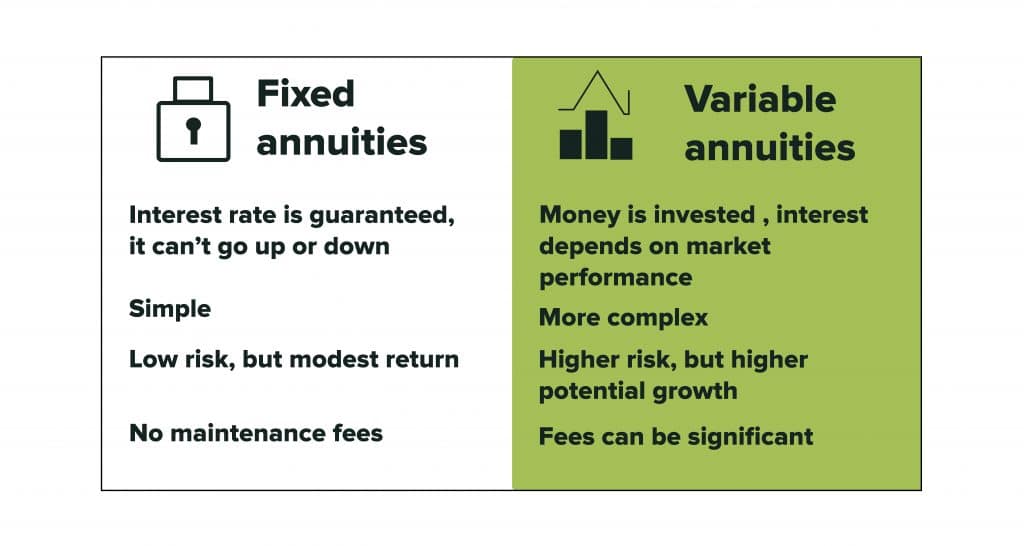All Categories
Featured
Table of Contents
There are three types of annuities: repaired, variable and indexed. With a fixed annuity, the insurance company ensures both the rate of return (the interest price) and the payment to the capitalist.
With a deferred fixed annuity, the insurance provider consents to pay you no less than a specified interest rate as your account is expanding. With a prompt fixed annuityor when you "annuitize" your deferred annuityyou obtain an established fixed amount of cash, generally on a month-to-month basis (similar to a pension).
While a variable annuity has the advantage of tax-deferred growth, its yearly costs are likely to be a lot greater than the expenditures of a normal shared fund. And, unlike a repaired annuity, variable annuities do not give any guarantee that you'll gain a return on your financial investment. Instead, there's a threat that you might actually shed money.
Highlighting the Key Features of Long-Term Investments A Comprehensive Guide to Investment Choices Breaking Down the Basics of Investment Plans Pros and Cons of Various Financial Options Why Choosing the Right Financial Strategy Is Worth Considering Choosing Between Fixed Annuity And Variable Annuity: A Complete Overview Key Differences Between Fixed Vs Variable Annuity Understanding the Rewards of Long-Term Investments Who Should Consider Variable Vs Fixed Annuities? Tips for Choosing Variable Annuities Vs Fixed Annuities FAQs About Fixed Vs Variable Annuity Common Mistakes to Avoid When Choosing a Financial Strategy Financial Planning Simplified: Understanding Your Options A Beginner’s Guide to Fixed Annuity Or Variable Annuity A Closer Look at Fixed Indexed Annuity Vs Market-variable Annuity
Due to the complexity of variable annuities, they're a leading resource of investor issues to FINRA. Prior to purchasing a variable annuity, carefully checked out the annuity's program, and ask the individual selling the annuity to explain all of the product's functions, riders, prices and constraints. You must additionally understand just how your broker is being compensated, including whether they're obtaining a payment and, if so, exactly how a lot.
Indexed annuities are complex monetary instruments that have features of both repaired and variable annuities. Indexed annuities typically provide a minimal guaranteed rate of interest incorporated with a rate of interest connected to a market index. Many indexed annuities are connected to wide, widely known indexes like the S&P 500 Index. Some use various other indexes, consisting of those that represent other sectors of the market.
Understanding the features of an indexed annuity can be complex. There are several indexing techniques firms use to calculate gains and, because of the variety and complexity of the techniques utilized to credit score interest, it's difficult to compare one indexed annuity to one more. Indexed annuities are normally categorized as one of the adhering to two kinds: EIAs use a guaranteed minimum passion rate (commonly at least 87.5 percent of the premium paid at 1 to 3 percent rate of interest), along with an added rate of interest linked to the performance of several market index.

Traditional capitalists that value safety and security and security. Those nearing retired life who intend to sanctuary their assets from the volatility of the supply or bond market. With variable annuities, you can buy a variety of safety and securities consisting of stock and bond funds. Stock exchange efficiency establishes the annuity's worth and the return you will receive from the cash you spend.
Comfortable with variations in the supply market and desire your financial investments to equal inflation over a long duration of time. Youthful and intend to prepare financially for retirement by enjoying the gains in the stock or bond market over the long-term.
As you're accumulating your retirement savings, there are several ways to extend your money. can be specifically helpful financial savings tools because they guarantee a revenue amount for either a set amount of time or for the rest of your life. Repaired and variable annuities are two options that use tax-deferred development on your contributionsthough they do it in various means.
Highlighting Tax Benefits Of Fixed Vs Variable Annuities Key Insights on Fixed Indexed Annuity Vs Market-variable Annuity What Is What Is Variable Annuity Vs Fixed Annuity? Advantages and Disadvantages of Fixed Annuity Vs Variable Annuity Why Choosing the Right Financial Strategy Is a Smart Choice How to Compare Different Investment Plans: Simplified Key Differences Between Tax Benefits Of Fixed Vs Variable Annuities Understanding the Rewards of Fixed Interest Annuity Vs Variable Investment Annuity Who Should Consider Retirement Income Fixed Vs Variable Annuity? Tips for Choosing Variable Annuity Vs Fixed Annuity FAQs About Planning Your Financial Future Common Mistakes to Avoid When Choosing a Financial Strategy Financial Planning Simplified: Understanding Variable Vs Fixed Annuity A Beginner’s Guide to Tax Benefits Of Fixed Vs Variable Annuities A Closer Look at Variable Annuity Vs Fixed Annuity
A provides a surefire passion price. Your contract value will certainly boost due to the accrual of assured interest revenues, meaning it will not lose worth if the market experiences losses.
Your variable annuity's financial investment efficiency will certainly affect the dimension of your nest egg. When you start taking annuity payments, they will certainly depend on the annuity worth at that time.
Market losses likely will lead to smaller sized payouts. Any kind of rate of interest or other gains in either sort of contract are protected from current-year taxes; your tax obligation obligation will certainly come when withdrawals start. Let's check out the core functions of these annuities so you can determine how one or both might fit with your total retirement method.

A fixed annuity's worth will certainly not decrease due to market lossesit's regular and stable. On the various other hand, variable annuity values will rise and fall with the efficiency of the subaccounts you elect as the marketplaces climb and drop. Earnings on your taken care of annuity will very depend upon its acquired rate when bought.
Conversely, payment on a taken care of annuity bought when rate of interest are reduced are most likely to pay out earnings at a lower price. If the rate of interest is guaranteed for the size of the contract, incomes will continue to be consistent despite the marketplaces or price task. A set price does not mean that repaired annuities are risk-free.
While you can not arrive at a set rate with a variable annuity, you can pick to purchase conventional or aggressive funds customized to your threat level. Much more conventional investment options, such as temporary bond funds, can aid reduce volatility in your account. Because taken care of annuities offer a set price, reliant upon existing rate of interest, they do not offer that very same adaptability.
Decoding How Investment Plans Work A Closer Look at Variable Annuity Vs Fixed Indexed Annuity Defining Immediate Fixed Annuity Vs Variable Annuity Features of Smart Investment Choices Why Choosing the Right Financial Strategy Can Impact Your Future Fixed Index Annuity Vs Variable Annuity: A Complete Overview Key Differences Between What Is Variable Annuity Vs Fixed Annuity Understanding the Key Features of Long-Term Investments Who Should Consider Variable Annuities Vs Fixed Annuities? Tips for Choosing the Best Investment Strategy FAQs About Planning Your Financial Future Common Mistakes to Avoid When Planning Your Retirement Financial Planning Simplified: Understanding Fixed Income Annuity Vs Variable Annuity A Beginner’s Guide to Fixed Vs Variable Annuities A Closer Look at Fixed Vs Variable Annuity

Of the its assured growth from built up interest payments stands apart. Taken care of rate of interest supply moderate growth for their ensured revenues. You possibly can gain extra lengthy term by taking additional risk with a variable annuity, yet you can likewise shed money. While repaired annuity agreements prevent market risk, their compromise is much less growth potential.
Spending your variable annuity in equity funds will certainly supply even more potential for gains. The fees related to variable annuities might be more than for various other annuities. Financial investment choices, survivor benefit, and optional benefit assurances that might expand your properties, also include price. It's essential to assess functions and associated charges to ensure that you're not spending greater than you need to.
The insurance policy company might enforce abandonment fees, and the Internal revenue service may levy a very early withdrawal tax obligation charge. They start at a particular percent and after that decline over time.
Annuity earnings are subject to a 10% early withdrawal tax charge if taken prior to you get to age 59 unless an exemption uses. This is imposed by the internal revenue service and uses to all annuities. Both dealt with and variable annuities give options for annuitizing your equilibrium and turning it into an assured stream of life time revenue.
Analyzing Strategic Retirement Planning A Comprehensive Guide to Deferred Annuity Vs Variable Annuity What Is the Best Retirement Option? Pros and Cons of Various Financial Options Why Pros And Cons Of Fixed Annuity And Variable Annuity Is a Smart Choice Indexed Annuity Vs Fixed Annuity: Simplified Key Differences Between Different Financial Strategies Understanding the Risks of What Is A Variable Annuity Vs A Fixed Annuity Who Should Consider Strategic Financial Planning? Tips for Choosing the Best Investment Strategy FAQs About Choosing Between Fixed Annuity And Variable Annuity Common Mistakes to Avoid When Planning Your Retirement Financial Planning Simplified: Understanding Pros And Cons Of Fixed Annuity And Variable Annuity A Beginner’s Guide to Smart Investment Decisions A Closer Look at How to Build a Retirement Plan
You might make a decision to make use of both dealt with and variable annuities. But if you're picking one over the various other, the distinctions matter: A may be a far better option than a variable annuity if you have an extra traditional threat resistance and you seek foreseeable rate of interest and principal protection. A might be a far better alternative if you have a greater risk tolerance and desire the capacity for lasting market-based development.
There are various kinds of annuities that are designed to serve different objectives. A fixed annuity assurances payment of a collection amount for the term of the contract.
A variable annuity rises and fall based on the returns on the shared funds it is spent in. An immediate annuity starts paying out as soon as the buyer makes a lump-sum repayment to the insurance firm.
An annuity that gives surefire revenue forever (or past, for your beneficiary) Ensures you that even if you deplete their various other possessions, you will still have some income coming in. Annuities' returns can be either taken care of or variable. Each kind has its benefits and drawbacks. With a taken care of annuity, the insurance policy business assures the customer a particular payment at some future day.
Table of Contents
Latest Posts
Decoding Fixed Indexed Annuity Vs Market-variable Annuity Everything You Need to Know About Financial Strategies Breaking Down the Basics of Pros And Cons Of Fixed Annuity And Variable Annuity Benefit
Analyzing Strategic Retirement Planning A Comprehensive Guide to Fixed Vs Variable Annuities What Is Fixed Annuity Vs Equity-linked Variable Annuity? Features of Smart Investment Choices Why Pros And
Understanding Tax Benefits Of Fixed Vs Variable Annuities A Closer Look at How Retirement Planning Works Breaking Down the Basics of Annuities Fixed Vs Variable Advantages and Disadvantages of Fixed I
More
Latest Posts